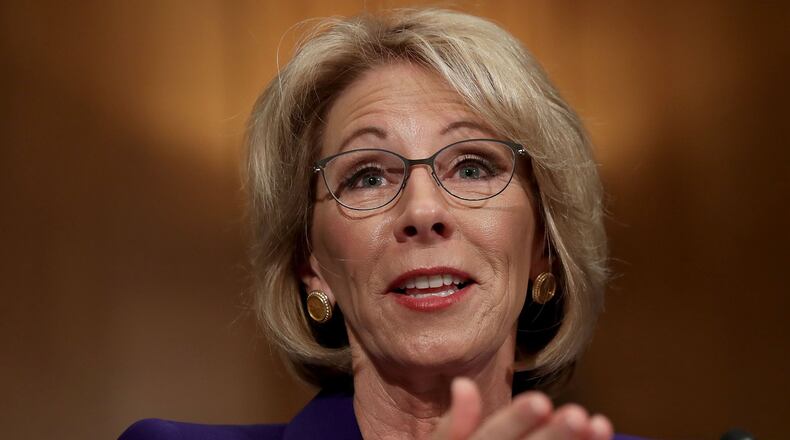Many believe that public schools will be under siege or underwater if Betsy DeVos wins confirmation to lead the U.S. Department of Education, which is likely to occur this week.
The Michigan billionaire and school choice champion has no education training, did not attend public schools or send her own children — making her a departure from prior U.S. education secretaries who had long years in the profession and a strong commitment to public education. (Nor has she ever taken out a federal student loan for herself or her children.)
Her responses at a contentious Senate confirmation hearing Tuesday ranged from “Interesting,” to “That is something we can discuss.” DeVos offered that she would end “one-size-fits-all” instruction, which can be translated to let’s privatize schools rather than figure out and fund innovation in existing schools.
Her explanation to why guns in schools should not be banned outright — a Wyoming school may need to defend itself against grizzly bears — likely accounted for coughing spasms around the country. (The Wyoming school DeVos cited told reporters it uses a fence to deter bears, not a gun.)
The hearing showed a deep partisan divide, with Republicans lauding DeVos as an outsider who will put parents and students before bureaucracies and Democrats pointing out her lack of experience and understanding of education.
DeVos appeared to make the Democrats’ job easier. The evasiveness of Donald Trump’s nominee, even to this question — should the federal government, by virtue of the funding it provides, enforce special education requirements — was worrisome.
She refused to say “yes” on the special ed question from Virginia Sen. Tim Kaine, telling him special education ought to fall to states. During that terse exchange, DeVos appeared not to grasp that federal civil rights laws require states meet specific standards for special ed if they accept federal dollars.
After rephrasing his question to prod a response and getting no traction, Kaine gave up, saying, “So some states might be good to kids with disabilities, and other states might not be so good, and then what, people can just move around the country if they don’t like how their kids are being treated?”
Special education standards once varied widely among states, and children often ended up warehoused or ignored, which is why the feds entered the fray. That critical chapter of history eluded DeVos, who appeared to have done no prep on federal education law. Under later questioning, she told senators she might be confused on the federal Individuals with Disabilities Education Act.
DeVos declined to commit that all schools getting tax dollars should be held to the same standards. In fact, she fought efforts for higher accountability of charter schools in her home state of Michigan, which has some of the weakest oversight and, in Detroit, lowest test score growth compared with other major U.S. cities on the National Assessment of Educational Progress. It would be difficult to build a case for expanded choice based on the performance of charter schools in her state.
Nor would DeVos commit to continuing the Education Department’s efforts to fight bullying and inequities in school discipline, declining to answer whether the agency under her direction would collect data on suspensions and expulsions, bullying and harassment.
Sen. Elizabeth Warren, D-Mass, targeted DeVos’ lack of experience, saying, “As education secretary, Betsy DeVos would be in charge of running a $1 trillion student loan bank. She has no experience doing that. Tonight at her confirmation hearing, I asked Betsy DeVos a straightforward set of questions about her education experience and commitment to protecting students cheated by for-profit colleges. If Betsy DeVos can’t commit to using the Department of Education’s many tools and resources to protect students from fraud, I don’t see how she can be the secretary of education.”
Many proponents have deemed DeVos a “breath of fresh air,” although she appears to know little about the job, the history of public education or current law. Ignorance may be bliss. However, as any civil rights lawyer will tell you, neither ignorance nor fresh air is a defense against failing to enforce the laws of the land or flouting those laws.
About the Author
Keep Reading
The Latest
Featured



